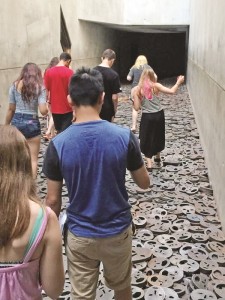Archive
You have to learn from history to avoid repeating it, say York Region students
November 5, 2014 · 0 Comments

By Brock Weir
The old saying goes you can’t understand what someone has experienced until you have walked a mile in their shoes.
There are some cases, however, when walking that mile can’t even begin to skim the surface of someone’s experiences – and this was a point driven home by students from across the York Catholic District School Board who spent this past summer in Germany and Poland retracing the lives of those who lost theirs during the Holocaust.
Students from across York Region will be in Thornhill this Thursday, November 7, to share their experiences to mark the 34th annual Holocaust Education Week.
Over 30 students from across the Board from Grades 9 – 12 made the trip this summer to “examine the Holocaust from a Christian perspective”, visiting such sites including Majdanek, Buchenwald, Auschwitz-Birkenau, Treblinka, the Jewish Museum in Berlin, and the Memorial to the Murdered Jews of Europe.
Their presentation this week, spearheaded by Aurora’s St. Maximilian Kolbe Catholic High School, will bring together each student’s experiences, the experiences they heard first hand from survivors, and dramatic interpretations and readings from students who examined the Holocaust from home.

“This image was particularly of meaning to me because it reflects our learning experience at the Jewish Museum in Berlin. The challenge was to walk to the end of the path and return with the attempt of making as little sound as possible. It was near impossible to do so. This was demonstrative of how it was impossible for people at the time of the Holocaust to walk all over the Jewish people without making sounds. We cannot stand in silence while others are suffering, and we must resist injustices.” – Oliver Fung
“It is definitely an entirely different experience because it is really hard to understand and experience what the Holocaust was just through a textbook,” says Markham student Oliver Fung, who was on hand at St. Max to rehearse the presentation last week. “By having the chance to get to where it actually occurred in Europe, I actually got the sense that it is real, it is not just numbers and stories.
“It was a really eye-opening experience being where it was. It just opened up my eyes to how humans could have been so horrible to each other. The experience really taught me about accepting other people. It was an emotional trip for a lot of people and really hard to describe.”
It is an experience Oliver hopes to convey through both the spoken word and through his photographs.
When they visited Treblinka, they had the opportunity to meet Aaron, a Holocaust survivor, who relayed to students how his parents and family did not survive.
“His father’s last message to him was to run and never stop running,” Oliver recalls. “He shared a lot of appreciation that such a young group had the will to understand the Holocaust and to learn from it. The most lasting image for me is a series of images from Auschwitz and in one of the buildings there is a hall full of pictures of prisoners. When you look at each individual image, you see an actual individual, not just a victim of the Holocaust. You see their emotions through their pictures, learn what they did for a living, and when they passed away. It is not just statistics, it was six million individuals. Each person has a story and that left a lasting impact on me.”
While Oliver will serve as the event’s emcee, other students, particularly those from St. Max, will be bringing the stories of others to life through dramatic readings and performances. When The Auroran sat in on rehearsals last week they were preparing a tableau on the life of Irena Sendler, a Polish nurse who smuggled thousands of children out of the Warsaw ghetto.
At the culmination of the tableau, the performers cast aside their non-descript white masks to drive home that, again, each person was an individual and an individual with their own story.
“I really wanted to be a part of this because I thought it could bring some change to future generations if they know what happened in the past so it wouldn’t occur in the future,” says Maura Delmedico, an Aurora student who is participating in the program for the second year running. “The Holocaust really opens up your eyes to how horrible people can be and even in our daily lives we hear some racial comments and people tend to overlook them. Those are the comments that really start to lead to bigger things. Through doing this, it reaches out to the community and allows people to understand that we really need to change the way we think and treat others.”
As the years go on, many people start to lose the context of the Holocaust, particularly the damage it caused and the fact many people to this day are still coming to terms with something that is almost impossible to come to terms with, something still very personal to them, nearly 70 years after the fact.
“Survivors are still living with what happened,” she adds. “When you learn about it in school you don’t fully grasp how damaging it is. It is hard to wrap your brain around [the extent] of it. At least through this, students can see things in a different way.”
Adds Oliver: “Things are happening similar to the Holocaust right now in the Middle East and in other parts of the word. I hope people leave the presentation with the understanding that this is a human family. There shouldn’t be prejudice. We are all victims and perpetrators of that. We have to realise this fact and this fact would really help prevent further stereotypes, prejudice and violence against other people.”

St. Max students prepare a tableau in honour of Irena Sendler.











